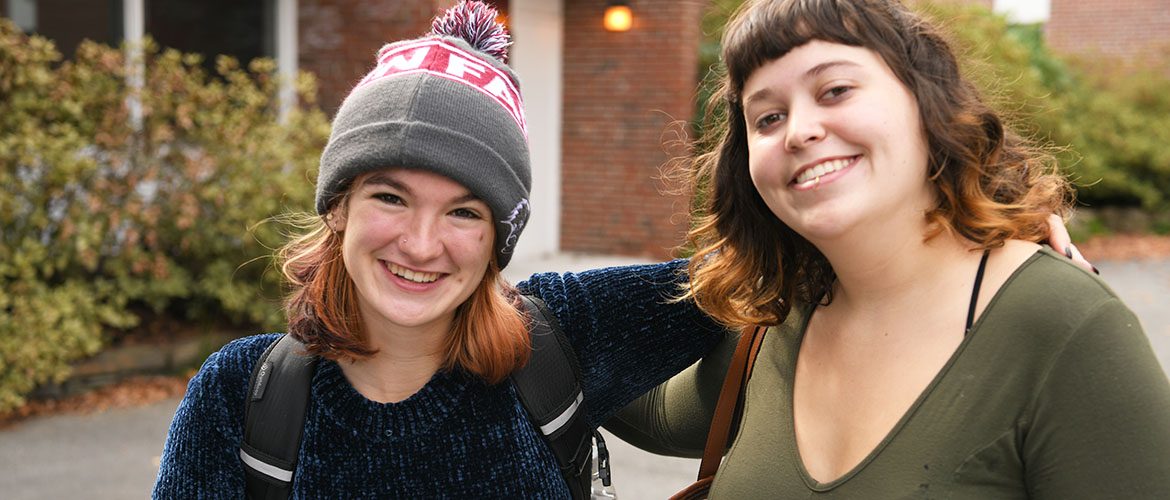Early College at UMF allows you to explore what college is all about. Dig into areas of passion or future career paths, work with UMF faculty, and participate in projects, debates, and discussions with university students.
Keeping Credits with Purpose at the forefront, we work with you to select the courses that best fit your interests and needs, often leading you to need fewer classes in college — saving you money and time. Participating in an Early College program may also result in you having to take fewer high school classes because some of your college courses replace your high school classes.
Early College programs are offered at all of University of Maine System universities, each offering something a bit different. UMF prides itself in offering students opportunities to be in classes that are often small, hands-on (even when online) and student-centered.
Early College Pathways at UMF
Early College Pathways at the University of Maine at Farmington allow you to explore careers, programs, and majors at UMF while also pursuing meaningful coursework that will have relevance — both now and once you’re in college. Interested in learning more?
Visit Early College Pathways for details and information on how to register.
What are some benefits of UMF’s Early College program?
Research has shown that high school students who enroll in Early College courses are more likely to graduate high school, enroll in college and earn a college degree.
- Early College students can show college admissions officers that they’re ready for more difficult coursework
- Early College students typically have better study skills, more academic confidence and less anxiety about the upcoming transition to college
- Early College students enter college with college credits under their belts and are more likely to earn a degree on time than students with no Early College credits
- Early College is TUITION FREE for Maine residents. Some fees may apply and students are responsible for textbook costs, though this can sometimes be covered by the university or a student’s school district. If textbook costs are a barrier to participation, please contact Director of Early College Kirsten Petroska kirsten.petroska@maine.edu
I think Early College really prepares you well. Taking college-level classes made my transition to college way easier — and I didn’t have to pay extra for it. I feel like my freshman year of college is easier than my senior year of high school. And unlike my roommates, I can get 8 hours of sleep and I still have some free time. Plus, I was able to fit in the English Language Learner Certificate class I wanted to do.
— Gabby Jolin
Early College student
Graduated from Foxcroft Academy
Early College — FAQs
Two Ways to Attend Early College
Aspirations
Students who live close enough to the University of Maine at Farmington can take courses here on campus with UMF faculty members — attending class in person with UMF students. Students anywhere in the state may take classes from our ever-growing list of online offerings as well.
Concurrent Enrollment
Through this option, you can take courses at one of our partner high schools where highly qualified and screened high school teachers offer specifically designed courses you can take (there) for college credit. Each approved high school teacher works closely with a UMF faculty member, ensuring appropriate course content and high college-level academic rigor.
UMF Partner High Schools and Concurrent Enrollment Offerings
- Erskine Academy: Creative Writing
- Mt. Blue High School: Biology (Phage Quest), Pre-Engineering Physics (through Bridge Academy)
- Oxford Hills Comprehensive High School: Introductory Biology
- Dirigo High School: Writing Seminar, Topics in English (topic varies by school year), Introductory Biology
- Carrabec High School: Precalculus
- Old Town High School: Writing Seminar (ENG 100), Topics in English (topic varies by school year)
- Waynflete Academy: Calculus II: Introduction to Advanced Biology, Astronomy
- Carrabassett Valley Academy: Topics in English (topic varies by school year), Introductory Biology
Have questions? Contact me.
Kirsten Petroska
Director of Early College Partnerships
Division of Graduate & Continuing Education
University of Maine at Farmington
Theo Kalikow Education Center
186 High Street
Farmington, Maine 04938
tel 207-778-7266
TYY (via Maine Relay Service) dial 711
kirsten.petroska@maine.edu
Mailing address:
Division of Graduate & Continuing Education
University of Maine at Farmington
111 South Street
Farmington, Maine 04938


